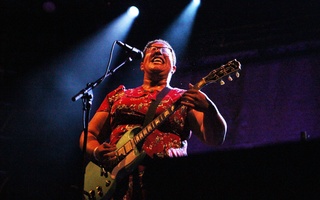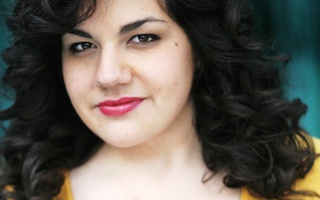{shortcode-6c1aa16f729e6cd80808fdc80fb3d66b83a030b5}The Cambridge-based folk band Darlingside blends vocals and an eclectic array of instruments, ranging from the classical violin to the mandolin. The four members of the group, who met in a Williams College a cappella group, are now on tour playing songs off their critically acclaimed 2015 album “Birds Say,” and will appear at the Sinclair in Cambridge on March 26. Bassist Dave Senft sat down with the Harvard Crimson to talk about the sources of the group’s sound.
The Harvard Crimson: What is your personal favorite song off your new album “Birds Say”?
Dave Senft: I guess there’s a reason that we named the album “Birds Say,” the same as the track “Birds Say.” I don’t know if it’s fair to say that that’s my favorite song, but that’s a song that we had never played live. When we went in to record the album, it wasn’t even finished really. We just had some ideas. It really came together during the recording process… So by the time we finished recording the vocals it was 3 or 4 a.m., and we just had this brand-new song that we had all finished together. It was very powerful, what we felt after that process. Among other reasons, I think that’s why we gravitated toward using a lyric from that song for the title of the album.
THC: What sources do you draw from when you’re writing lyrics?
DS: When we first became involved in songwriting, we were each writing our own songs, and then we began to team up more and more, and now it’s at the point where we basically write every song together, as four people. Every song is a little bit different, and every song comes from four different people, so of course depending on who you talk to, there will be a lot of different sources of inspiration. We do tend to write a lot about childhood and growing up and how things change as you get older… We’re also thinking a lot about the sounds of the words that we’re using, as one component of the way the song is arranged. It’s like how a cello sounds different from a violin, so you’re going to use a cello differently than you would use a violin, and you’re going to choose different moments in which to use each. The same goes for the “o” sound of a word or the “ah” sound or the “ooh” sound. A lot of times when we’re writing the melodies we’re thinking about what sounds we really like in this or that moment, whether we want an “ah” sound or an “ooh” sound, and then we’ll take those sounds and we’ll figure out what words match those sounds and build off from there.
THC: Could you describe your working process? How do all four of you work together?
DS: I think a lot of times when you’re writing a song you get really excited about an idea, and you want the song to be exactly the way it is in your head, and so letting go of some of those ideas and letting someone else in on that process is very hard. You have to be able to be vulnerable. You have to be able to defend your ideas but also to let them go. We’ve spent a lot of time honing that process, and I think in the end it comes down to the fact that we’re all really close friends. We met in college, we sang together in college, long before we were in this band. That certainly helps with being able to trust and to let go of our ideas and be vulnerable with each other. That’s been a beautiful process to develop over the last ten years.
THC: Do you have any advice for college students interested in pursuing music professionally?
DS: When we started out, we were talking about the idea of going into a musical career, and somehow the idea of a Plan B came up, like what would be the back-up plan for different people in the group. And I think it was the dad of one of the guys in the group who said, “Don’t have a Plan B.” That was his advice… That’s not to say that at some point you might not have to face the fact that it’s not working and find something else, but if you go in with a well-formulated back-up plan you’re going to find that there will be a time when you fall back on that. It’s in some ways easier and better to go in with no back-up plan so that you are just forced to try, even when it’s incredibly hard and it seems like it’s not working.
THC: Are there musical traditions that you as a group see yourselves as being part of?
DS: As a group, I think we’re pretty excited about the Boston music scene right now. We sort of moved to Boston accidentally. We were living in North Hampton, and some of our significant others were in Boston, so we just kind of thought we’d move here and see what it was like being in a city. We’ve ended up becoming incredibly close with a few other Boston acts. We’ve been feeling like there might be a new tradition starting, that we’re a part of, of Boston-based folk music.
THC: How do you forge a coherent sound from the wide variety of instruments—from cello to mandolin, double bass to banjo—that you all play?
DS: We have so many instruments at our disposal, and in some cases we’ve picked up new instruments for the band. I played a little guitar in college, but I never played bass until the band. Don [Mitchell] learned banjo for the band. We’ve started to see all the instruments as different voices. We met in an a cappella group, and in a cappella you’re often using your voice to sound like different instruments. There’s something freeing in that approach, and that’s something we’ve taken a little bit into what we’re doing now, where any instrument can really be doing anything. You can use a cello to sound like a voice, you can use a guitar as a percussion instrument. There are traditional roles that instruments can play, and we like thinking about how we can flip those around… It’s something that I think has come to define our sound, the way that we combine instruments differently than a lot of other groups.
—Staff writer Elizabeth C. Keto can be reached at elizabeth.keto@thecrimson.com.Read more in Arts
Music Video Breakdown: ‘Work’ by RihannaRecommended Articles
-
 Boston Calling September 2015: Alabama Shakes
Boston Calling September 2015: Alabama Shakes -
 Artist Spotlight: Andrew Wyatt of Miike Snow
Artist Spotlight: Andrew Wyatt of Miike Snow -
 Artist Spotlight: Birdy
Artist Spotlight: Birdy -
‘Revolution Radio’ Makes An Attempt at Revival“Revolution Radio” has an extremely unoriginal and predictable sound that—coupled with lyrics that are similar in quality to those written by a Disney boy band—fails to bring Green Day anywhere close to the magic they created in their heyday.
-
 Portrait of an Artist: Lauren Kidwell
Portrait of an Artist: Lauren Kidwell













